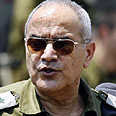
The day Halutz broke
Halutz's resignation may mark his desire to become accuser instead of accused
Contrary to others, he was the only one who really read all the investigation reports. Every line was seared into his consciousness. In public, he tried to fake it, to cynically reject personal attacks, announcing that he would not serve his head on a platter.
But deep inside, he was spitting blood. Deep within, he knew who to point the finger at for their contribution or lack of contribution to the outcome of the war. However, at the same time he also understood that the bottom line meant that the person heading the pyramid was the one who should be held accountable.
Like a real military man with a moral backbone, he understood that the only inevitable outcome of the lessons learned would be to draw personal conclusions.
Unprecedented decision
Halutz made a courageous decision Tuesday, unprecedented in our parts. He should be saluted for this. This decision will be viewed favorably in the annals of history. Halutz's resignation constitutes an earthquake.
A chief of staff has never before resigned of his free will due to failures of war. On the other hand, his resignation seems to have let off a sigh of relief in the army. As long as the chief of staff is under constant attack, it is tantamount to the entire army being under attack. It couldn't move. Perhaps now it will be able to start working without being looked at through a magnifying glass.
Halutz's resignation came as a surprise to his military associates, members of the General Staff forum. He didn't deliberate and didn’t consult them. He only informed a few after placing his resignation letter on the defense minister's table late Tuesday night.
Besides, all the investigations, in one form or another, focus on him. Simultaneously, all the investigations are flowing to the Winograd Commission. In the event that the Winograd Commission issues a letter of warning, it would be reasonable to assume that Halutz would be one of the persons being cautioned.
End of the road
Dan Halutz announced that he would terminate his term in office if one of the following conditions were met: If his superiors tell him to do so, if the military investigations mark him, if the Winograd Commission tells him to go, or when he feels he is losing the military's trust and can no longer lead the rehabilitation process.
Have any of these conditions been met so far? It is not clear. It would be more reasonable to assume that it was an internal decision, premised on the sense of reaching the end of the road.
A hint of this appears in his letter of resignation: "It is human nature not to want to serve in a system that is not appreciated and not protected by its dispatchers…" This is a terrible sentence. Who are the persons who do not protect the system? The defense minister? The prime minister?
As long as the man continues to don his uniform we shall not get an answer to this question. We may however, get the answer from civilian Danny Halutz when he appears before the Winograd Commission, when he is free of the loyalty to his superiors when in uniform.
From the accused to the accuser
Perhaps this is where the timing of his resignation lies: Dan Halutz would want to appear before the Winograd Commission of inquiry as a civilian. Because as a civilian he can take off his gloves and be transformed from being the accused to being the accuser.
The timing of his resignation is convenient for all. Halutz has completed the investigation phase in the army – the phase where an x-ray was performed on the military organization – and now he is passing the baton of the in-depth rehabilitation process to his successor.
It follows that Halutz's resignation will only go into effect after the political elite has assigned a permanent replacement or temporary substitute. Throughout the past months Halutz made it clear to his surroundings that that his preferred successor is his deputy, Major General Moshe Kaplinsky.
A resignation automatically creates a situation of unease. There are candidates from the outside such as Director General of the Defense Ministry Gabi Ashkenazi, and there are candidates from within. The political echelons, namely the defense minister and prime minister, are faltering themselves - a decision must be made quickly.










